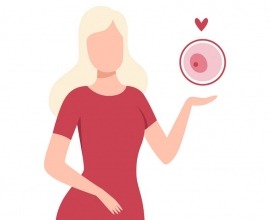Celiac Disease: A Missing Factor in Infertility?
Imagine that something would be causing one less pregnancy from a group of 40 women whom had all been trying to conceive. That something is that all these women would be diagnosed with celiac disease two years later, which could quite possibly explain their troubles with conceiving and bringing a baby to full-term. This is the exact situation a Danish study uncovered in recent years, on top of the well-established fact that nearly 6.7 million American women have difficulty getting pregnant.[1]
A correlation between infertility and celiac disease

How celiac disease exactly affects fertility of men and women has yet to be pinpointed, yet many hypothesize that nuances related to malabsorption may be to blame. On top of this, an Italian study related to men and celiac disease found a correlation between the disease and greater deficiencies of the male hormone androgen, gonadal dysfunction and even morphological issues in semen.[2]
Some elements of fertility were tracked meticulously in Denmark, thanks to the Danish National Patient Register who provided records of 63,166 women. Variables included chances and timing of certain outcomes in pregnancy, which ultimately included number of live and stillbirths, as well as existence of molar, ectopic pregnancy and miscarriage. When comparing the health records of undiagnosed celiac to non-celiac women, researchers found that more than one child wouldn’t make it to full-term after conception per 100 women whom had yet to be diagnosed with the autoimmune disease.[3]
In some cases, women suffer through still birth, repeated miscarriages and might carry a baby to full-term that is born severely underweight.[4] Yet, hope can be found! A Swedish medical study of 11,000 women revealed the potential to heal and regain your fertility, post-treatment and adherence to a gluten-free diet.[5]
Consider screening for celiac disease if struggling with unexplained infertility
Other fertility studies have indicated that a number of pregnancy complications could arise even when a woman has only subtle symptoms of celiac disease. These “silent” symptoms may be easily overlooked and could build up in intensity over many years simply due to the slow deterioration of intestinal villi and consistent inflammation. Meanwhile, this disease could be causing you:
-
Miscarriages and other heartbreaking pregnancy complications
-
Pregnancy-related hypertension
-
Severe anemia
-
Intrauterine growth retardation
The point here is to avoid relying on gastrointestinal symptoms as a possible indication that you may have celiac disease, because unexplained infertility can serve as a symptom in of itself.[6]
Look beyond the fine print
When you begin looking for those various ingredients on a food label, you will inevitably be startled by what you’ll find. You might find gluten hidden in your favorite can of soup as a starch, surprisingly, or in a candy you like to splurge on listed as “natural flavor”. Some advice you’ll find spread throughout the internet is to vet every company you can manage to vet, support companies that swear by transparency and list cross-contamination risks, as well as purge your house of shampoos, toothpaste, lip balms and makeup products that aren’t verified to be gluten-free. Even your old wooden spoon could be harboring microparticles of gluten, and you don’t want to risk developing malnutrition, anemia or osteoporosis because of a sentimental attachment to an old, contaminated, wooden spoon, would you?
On a last thought, remember these two things. Get tested before adopting a gluten-free diet, which is recommended to increase the test’s accuracy, and, secondly, remember that altering your diet will help you reclaim your fertility.
At our Czech clinic, we offer affordable fertility treatment so that you can incorporate your family-planning goals into a memorable vacation. Check out this link here for more details.
Sources
[1] “Infertility and Celiac Disease.” Beyond Celiac, 10 Feb. 2021, www.beyondceliac.org/celiac-disease/related-conditions/infertility/.
[2] Ibid.
[3] Ibid.
[4] Ratner, Amy. “Celiac Disease Reproductive Health Heartbreak.” Beyond Celiac, 6 July 2018, www.beyondceliac.org/research-news/celiac-disease-reproductive-health-he...
[5] Anderson, Jane. “Is Celiac Disease Why You Can't Get Pregnant?” Edited by Priyanka Chugh, Verywell Health, Dotdash, 26 Oct. 2020, www.verywellhealth.com/celiac-disease-and-infertility-562998.
[6] Ibid.














